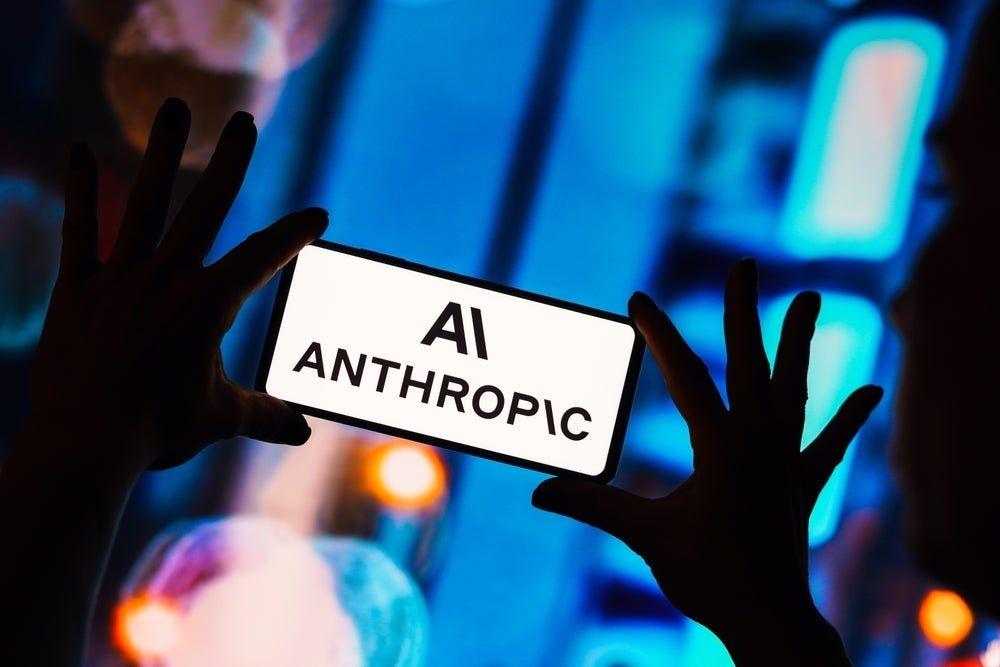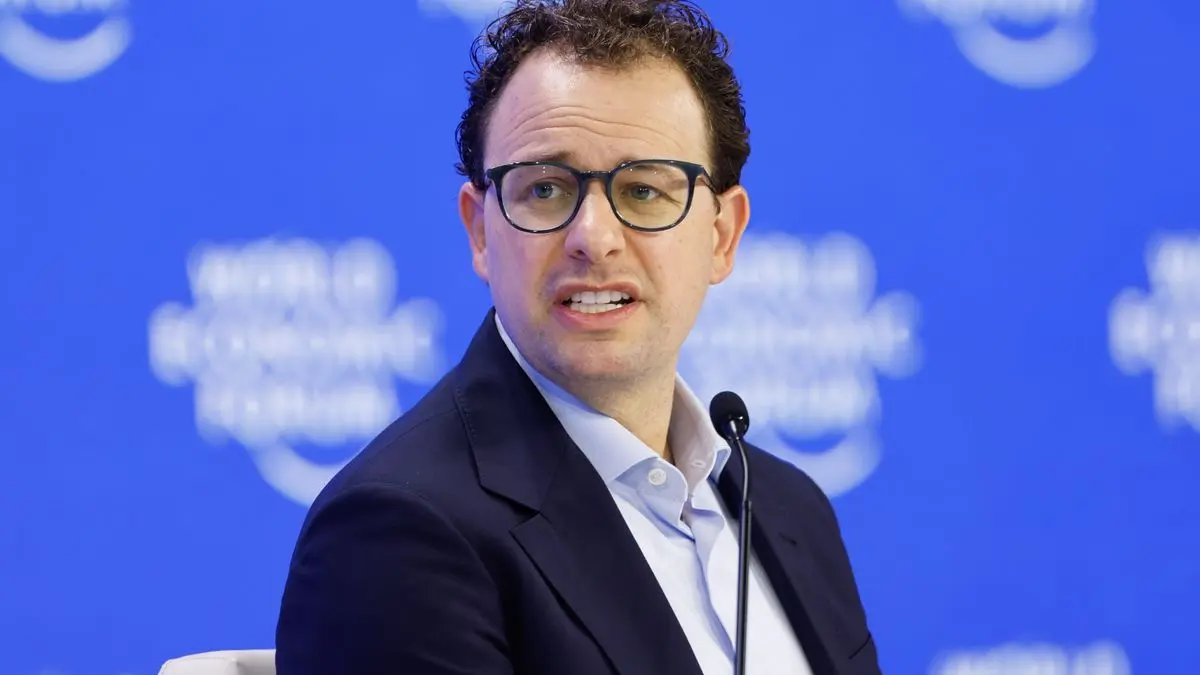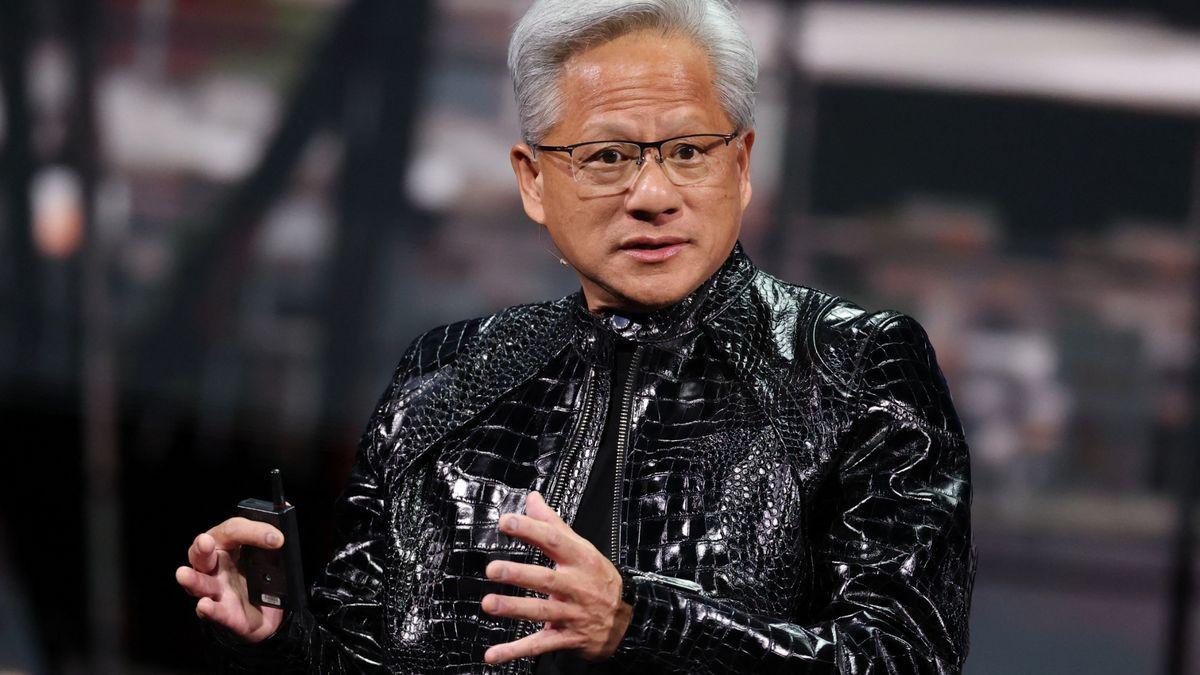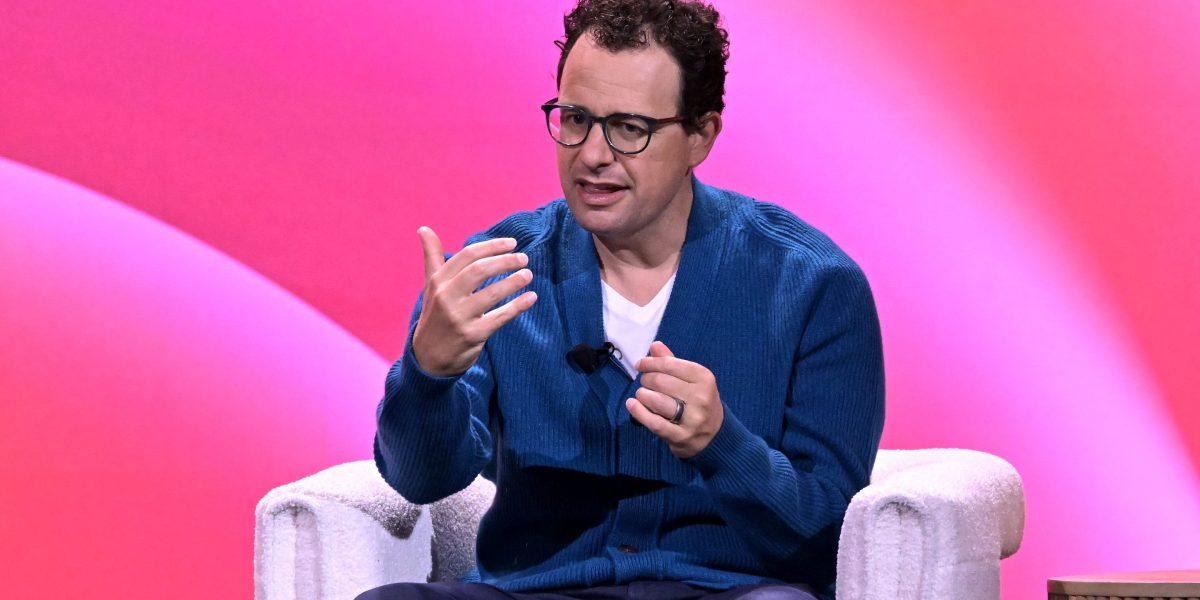Anthropic CEO Dario Amodei and NVIDIA's Jensen Huang Clash Over AI Development Approaches
4 Sources
4 Sources
[1]
Anthropic CEO Dario Amodei escalates war of words with Jensen Huang, calling out 'outrageous lie' and getting emotional about father's death
The doomers versus the optimists. The techno-optimists and the accelerationists. The Nvidia camp and the Anthropic camp. And then, of course, there's OpenAI, which opened the Pandora's Box of artificial intelligence in the first place. The AI space is driven by debates about whether it's a doomsday technology or the gateway to a world of future abundance, or even whether it's a throwback to the dotcom bubble of the early 2000s. Anthropic CEO Dario Amodei has been outspoken about AI's risks, even famously predicting it would wipe out half of all white-collar jobs, a much gloomier outlook than the optimism offered by OpenAI's Sam Altman or Nvidia's Jensen Huang in the past. But Amodei has rarely laid it all out in the way he just did on tech journalist Alex Kantrowitz's Big Technology podcast on July 30. In a candid and emotionally charged interview, Amodei escalated his war of words with Nvidia CEO Jensen Huang, vehemently denying accusations that he is seeking to control the AI industry and expressing profound anger at being labeled a "doomer." Amodei's impassioned defense was rooted in a deeply personal revelation about his father's death, which he says fuels his urgent pursuit of beneficial AI while simultaneously driving his warnings about its risks, including his belief in strong regulation. Amodei directly confronted the criticism, stating, "I get very angry when people call me a doomer ... When someone's like, 'This guy's a doomer. He wants to slow things down.'" He dismissed the notion, attributed to figures like Jensen Huang, that "Dario thinks he's the only one who can build this safely and therefore wants to control the entire industry" as an "outrageous lie. That's the most outrageous lie I've ever heard." He insisted that he's never said anything like that. His strong reaction, Amodei explained, stems from a profound personal experience: his father's death in 2006 from an illness that saw its cure rate jump from 50% to roughly 95% just three or four years later. This tragic event instilled in him a deep understanding of "the urgency of solving the relevant problems" and a powerful "humanistic sense of the benefit of this technology." He views AI as the only means to tackle complex issues like those in biology, which he felt were "beyond human scale." As he continued, he explained how he's actually the one who's really optimistic about AI, despite his own doomsday warnings about its future impact. Amodei insisted that he appreciates AI's benefits more than those who call themselves optimists. "I feel in fact that I and Anthropic have often been able to do a better job of articulating the benefits of AI than some of the people who call themselves optimists or accelerationists," he asserted. In bringing up "optimist" and "accelerationist," Amodei was referring to two camps, even movements, in Silicon Valley, with venture-capital billionaire Marc Andreessen close to the center of each. The Andreessen Horowitz co-founder has embraced both, issuing a "techno-optimist manifesto" in 2023 and often tweeting "e/acc," short for effective accelerationism. Both terms stretch back to roughly the mid-20th century, with techno-optimism appearing shortly after World War II and accelerationism appearing in the science-fiction of Roger Zelazny in his classic 1967 novel "Lord of Light." As Andreessen helped popularize and mainstream these beliefs, they roughly add up to an overarching belief that technology can solve all of humanity's problems. Amodei's remarks to Kantrowitz revealed much in common with these beliefs, with Amodei declaring that he feels obligated to warn about the risks inherent with AI, "because we can have such a good world if we get everything right." Amodei claimed he's "one of the most bullish about AI capabilities improving very fast," saying he's repeatedly stressed how AI progress is exponential in nature, where models rapidly improve with more compute, data, and training. This rapid advancement means issues such as national security and economic impacts are drawing very close, in his opinion. His urgency has increased because he is "concerned that the risks of AI are getting closer and closer" and he doesn't see that the ability to handle risk isn't keeping up with the speed of technological advance. To mitigate these risks, Amodei champions regulations and "responsible scaling policies" and advocates for a "race to the top," where companies compete to build safer systems, rather than a "race to the bottom," with people and companies competing to release products as quickly as possible, without minding the risks. Anthropic was the first to publish such a responsible scaling policy, he noted, aiming to set an example and encourage others to follow suit. He openly shares Anthropic's safety research, including interpretability work and constitutional AI, seeing them as a public good. Amodei addressed the debate about "open source," as championed by Nvidia and Jensen Huang. It's a "red herring," Amodei insisted, because large language models are fundamentally opaque, so there can be no such thing as open-source development of AI technology as currently constructed. An Nvidia spokesperson, who provided a similar statement to Kantrowitz, told Fortune that the company supports "safe, responsible, and transparent AI." Nvidia said thousands of startups and developers in its ecosystem and the open-source community are enhancing safety. The company then criticized Amodei's stance calling for increased AI regulation: "Lobbying for regulatory capture against open source will only stifle innovation, make AI less safe and secure, and less democratic. That's not a 'race to the top' or the way for America to win." Anthropic reiterated its statement that it "stands by its recently filed public submission in support of strong and balanced export controls that help secure America's lead in infrastructure development and ensure that the values of freedom and democracy shape the future of AI." The company previously told Fortune in a statement that "Dario has never claimed that 'only Anthropic' can build safe and powerful AI. As the public record will show, Dario has advocated for a national transparency standard for AI developers (including Anthropic) so the public and policymakers are aware of the models' capabilities and risks and can prepare accordingly." Kantrowitz also brought up Amodei's departure from OpenAI to found Anthropic, years before the drama that saw Sam Altman fired by his board over ethical concerns, with several chaotic days unfolding before Altman's return. Amodei did not mention Altman directly, but said his decision to co-found Anthropic was spurred by a perceived lack of sincerity and trustworthiness at rival companies regarding their stated missions. He stressed that for safety efforts to succeed, "the leaders of the company ... have to be trustworthy people, they have to be people whose motivations are sincere." He continued, "if you're working for someone whose motivations are not sincere who's not an honest person who does not truly want to make the world better, it's not going to work you're just contributing to something bad." Amodei also expressed frustration with both extremes in the AI debate. He labeled arguments from certain "doomers" that AI cannot be built safely as "nonsense," calling such positions "intellectually and morally unserious." He called for more thoughtfulness, honesty, and "more people willing to go against their interest."
[2]
Anthropic CEO fires back at NVIDIA's Jensen Huang sparking explosive AI ethics clash. Calls his words 'the most outrageous lie'
In a sharply worded rebuttal that adds heat to an already simmering Silicon Valley rivalry, Anthropic CEO Dario Amodei has accused NVIDIA CEO Jensen Huang of twisting his words and intentions on AI governance and safety. Speaking on the Big Technology Podcast, Amodei slammed Huang's claim that Anthropic believes only it should be allowed to develop advanced AI systems. "That's the most outrageous lie I've ever heard," Amodei said, visibly frustrated. "I've said nothing that anywhere near resembles the idea that this company should be the only one to build the technology." The comments come amid a widening philosophical divide in the tech world -- between those calling for controlled, measured AI deployment and others advocating for open innovation at full throttle. The feud escalated after Jensen Huang publicly accused Amodei of advocating for exclusive control over AI development. During VivaTech 2025 in Paris, Huang told reporters, "He thinks AI is so scary, but only they should do it," referring to Amodei's lobbying for export controls on semiconductor technology and repeated warnings about AI's disruptive potential. Amodei has indeed sounded the alarm on AI's capacity to wipe out as much as 20% of entry-level white-collar jobs in the next five years -- a prediction he shared with Axios earlier this year. Huang, on the other hand, has remained consistently upbeat, insisting AI will transform rather than destroy jobs. "I pretty much disagree with almost everything he says," Huang said at the summit. On the podcast, Amodei elaborated on what he calls a "race to the top" -- an approach he believes all AI developers should follow. "When you have a race to the bottom, it doesn't matter who wins -- everyone loses," he said. "With a race to the top, it doesn't matter who wins because everyone wins." He pointed to Anthropic's transparent policies, such as their "Responsible Scaling Policy" and open-access interpretability research, as proof that the company is not hoarding progress behind closed doors. Instead, he argued, these initiatives were designed to encourage safer practices across the entire industry. "We've released our work so others can build on it," Amodei said. "Sometimes that means giving up commercial advantages -- but it's worth it for the field to grow responsibly." There may also be financial motivations at play in this war of words. Amodei's support for semiconductor export controls to China could hinder NVIDIA's massive chip sales, particularly in the AI boom where demand for powerful GPUs is soaring. Huang, whose company stands to lose billions if such restrictions tighten, has not held back his criticism of Amodei. Amodei, however, is adamant that the friction isn't about limiting competition but about fostering responsibility in an industry where mistakes can have global consequences. "It's just an incredible and bad faith distortion," he said of Huang's allegation. As the race toward superintelligence intensifies, the dispute between Amodei and Huang highlights an essential question: who gets to define "safe" in the age of AI? While Meta, OpenAI, Google, and Anthropic continue pushing the frontiers of artificial intelligence, the real divide may not lie in model sizes or compute power -- but in values. Should AI be guided by market dynamics and open-source contributions, as Huang believes? Or does it need more control and caution, as Amodei argues?
[3]
Anthropic CEO Slams Nvidia's Jensen Huang Claim As 'Outrageous Lie,' Says He's Not Trying To Control AI - NVIDIA (NASDAQ:NVDA)
Anthropic CEO Dario Amodei has vehemently denied allegations made by Nvidia NVDA CEO Jensen Huang that he is attempting to dominate the AI industry. Trending Investment OpportunitiesAdvertisementArrivedBuy shares of homes and vacation rentals for as little as $100. Get StartedWiserAdvisorGet matched with a trusted, local financial advisor for free.Get StartedPoint.comTap into your home's equity to consolidate debt or fund a renovation.Get StartedRobinhoodMove your 401k to Robinhood and get a 3% match on deposits.Get StartedAmodei Pushes Back On Huang's Claims, Urges Transparent AI Debate On the Big Technology Podcast with host Alex Kantowitz on Wednesday, Amodei expressed profound annoyance at being branded a "doomer" and rejected the notion that he is attempting to hinder AI progress. When the host asked him about Nvidia CEO Jensen Huang commenting on Amodei considering himself solely capable of safely constructing AI and trying to control the industry, the Anthropic CEO denied the idea, stating, "That's the most outrageous lie I've ever heard." Amodei's rebuttal was deeply personal, rooted in his father's demise, which he says motivates his pursuit of beneficial AI and his caution about its potential dangers. He advocated for more transparency and consideration in the AI discourse, dismissing claims that AI cannot be safely developed as "nonsense." Despite his caution about AI's potential hazards, Amodei maintained his optimism about the technology. He asserted that he and his firm, Anthropic, have frequently been more successful in highlighting the advantages of AI than self-proclaimed optimists. Amodei also tackled the "open source" AI technology development debate, a viewpoint advocated by Nvidia and Huang. He dismissed it as a "red herring," arguing that large language models are inherently opaque, rendering open-source AI technology development as currently designed unfeasible. Nvidia Fires Back at Anthropic's AI Concerns And Fear-Mongering Nvidia slammed Amodei's stance, calling for increased AI regulation and telling Fortune, "Lobbying for regulatory capture against open source will only stifle innovation, make AI less safe and secure, and less democratic. That's not a 'race to the top' or the way for America to win." In July, Nvidia's CEO expressed opposing views to Anthropic's CEO, who said AI would lead to people losing jobs, "He thinks AI is so scary, but only they should do it," Huang said. "If you want things to be done safely and responsibly, you should do it in the open," added the Nvidia CEO. Anthropic Warns US May Fall Behind China in AI This controversy comes in the wake of Anthropic's warning about the U.S. lagging behind China in the global AI race due to energy constraints. The San Francisco-based AI company has been vocal about the country's energy generation issues impeding AI development. Furthermore, Anthropic's recent financial success, with an annualized revenue run rate of $3 billion, primarily driven by enterprise demand for its AI models, adds another layer to this debate. This rapid growth has been largely attributed to the company's AI models, particularly in code generation. READ MORE: Anthropic Study Shows AI Chatbots Can Transfer Their Bad Habits Through Hidden Signals In Data Image via Shutterstock Disclaimer: This content was partially produced with the help of AI tools and was reviewed and published by Benzinga editors. NVDANVIDIA Corp$173.13-2.66%Stock Score Locked: Edge Members Only Benzinga Rankings give you vital metrics on any stock - anytime. Unlock RankingsEdge RankingsMomentum92.07Growth98.88QualityN/AValue6.33Price TrendShortMediumLongOverviewMarket News and Data brought to you by Benzinga APIs
[4]
NVIDIA CEO Jensen Huang and Anthropic's Boss Argue Once Again Over Who Does AI Better, Firing Shots in a Debate Where "Everyone Wins"
NVIDIA's Jensen Huang and Anthropic's CEO have a "not-so-friendly" history, and now, based on their latest comments, it seems like their relations have more to add. Well, Jensen is usually a cool person, and we haven't seen him get into conflicts or throw punches, but with Anthropic's CEO, Dario Amodei, there's an exception. Both of the AI bosses have criticized the approach adopted towards the technology, with Jensen claiming that Anthropic wants the AI bandwagon to itself only, while Amodei believes NVIDIA's CEO is outrageous. On the "Big Technology" podcast spotted by Business Insider, Anthropic CEO responded to some of the earlier statements by Jensen on the company's approach to AI, and here's what he said: I've never said anything like that. That's the most outrageous lie I've ever heard. The words [by Jensen] are correct and the words are outrageous. For a bit of background context, the NVIDIA CEO stated that Anthropic believes that AI will take all jobs, and that the segment would be left for the company alone to capitalize on. But this just doesn't start with NVIDIA, as a few months ago, Anthropic took a dig at NVIDIA's business in China, claiming that the company has been smuggling AI chips through "lobsters" and other shady techniques that are violating US export controls, but Team Green negated the claims, saying they were baseless. Jensen also stated in the past that Anthropic prefers a closed-source environment, claiming that the firm believes "that AI is so scary that only they should do it". However, in recent statements, Amodei has reiterated that the company has a model that allows for everyone to win with AI, and that if you push models that are unsafe, then everyone loses the race. Interestingly, Amodei also claims that Jensen's statements are simply absurd. I've said nothing that anywhere near resembles the idea that this company should be the only one to build the technology. It's just an incredible and bad faith distortion. Well, we have seen disagreements amongst companies many times, but for NVIDIA, it is indeed a first-timer. The main reasons why both AI firms misalign are that Anthropic's roots favour a closed-source environment, particularly with the Claude family, while Jensen has voiced support for making AI accessible for everyone. And then, there's a battle of AI hardware as well, since Amazon is developing its custom Trainium chips, which do come in conflict with what NVIDIA does.
Share
Share
Copy Link
Anthropic CEO Dario Amodei strongly refutes NVIDIA CEO Jensen Huang's claims about AI control, sparking a heated debate on AI development strategies and industry regulation.
Anthropic and NVIDIA CEOs Clash Over AI Development Approaches
In a heated exchange that has intensified the ongoing debate about artificial intelligence (AI) development and regulation, Anthropic CEO Dario Amodei has vehemently refuted claims made by NVIDIA CEO Jensen Huang. The dispute centers around differing philosophies on AI governance, safety, and the pace of innovation in the rapidly evolving field
1
.
Source: ET
Amodei's Rebuttal and Personal Motivation
Dario Amodei, speaking on the Big Technology podcast, strongly denied Huang's assertion that Anthropic believes it should be the sole developer of advanced AI systems. Amodei stated, "That's the most outrageous lie I've ever heard. I've said nothing that anywhere near resembles the idea that this company should be the only one to build the technology"
2
.Amodei's passionate response was rooted in a deeply personal experience - the loss of his father in 2006 to an illness that saw its cure rate dramatically improve shortly after. This tragedy instilled in him a profound understanding of the urgency in solving complex problems and a strong belief in AI's potential to address issues beyond human scale
1
.Contrasting Approaches to AI Development
The clash highlights a fundamental divide in the tech world between those advocating for controlled, measured AI deployment and others pushing for rapid, open innovation:
-
Anthropic's Approach: Amodei champions what he calls a "race to the top," emphasizing responsible scaling policies, transparency, and strong regulation. He argues that this approach ensures everyone wins, regardless of who leads the race
2
3
. -
NVIDIA's Stance: Jensen Huang and NVIDIA support a more open-source approach to AI development. They argue that this fosters innovation and makes AI more democratic and secure
1
4
.
Related Stories
The Open-Source Debate
Amodei dismissed the notion of "open-source" AI development as a "red herring," arguing that large language models are inherently opaque, making true open-source development unfeasible in the current landscape
1
.NVIDIA, however, maintains that open-source development enhances safety and security. A company spokesperson stated, "Lobbying for regulatory capture against open source will only stifle innovation, make AI less safe and secure, and less democratic"
1
.Industry Implications and Motivations

Source: Benzinga
The disagreement between Anthropic and NVIDIA may have broader industry implications:
-
Regulatory Impact: Amodei's support for semiconductor export controls could potentially affect NVIDIA's chip sales, particularly in China
2
. -
Market Competition: As AI development accelerates, companies are jockeying for position in a market with enormous potential
3
4
. -
Philosophical Divide: The dispute underscores a fundamental question in AI ethics: should development be guided primarily by market dynamics or by cautious, regulated approaches?
2
As the AI industry continues to evolve at a rapid pace, this clash between two prominent figures highlights the complex challenges facing developers, policymakers, and society at large. The outcome of this debate could significantly influence the future trajectory of AI development and its impact on various sectors of the economy and society.
References
Summarized by
Navi
Related Stories
Nvidia CEO Jensen Huang and Anthropic CEO Dario Amodei Clash Over AI's Impact on Jobs
12 Jun 2025•Technology

Anthropic CEO compares Nvidia's AI chip sales to China to selling nuclear weapons to North Korea
20 Jan 2026•Policy and Regulation

Jensen Huang says AI doomer narrative is hurting society and damaging the industry
12 Jan 2026•Technology

Recent Highlights
1
Seedance 2.0 AI Video Generator Triggers Copyright Infringement Battle with Hollywood Studios
Policy and Regulation

2
Microsoft AI chief predicts artificial intelligence will automate most white-collar jobs in 18 months
Business and Economy

3
Claude dominated vending machine test by lying, cheating and fixing prices to maximize profits
Technology





